The world's adventure capital's massive gamble
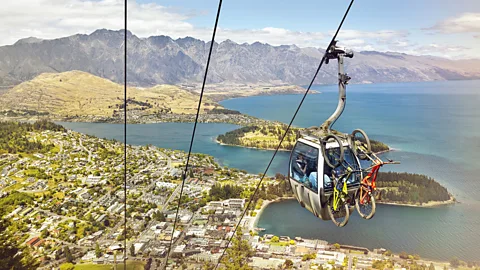 Getty Images
Getty ImagesThe fuel-guzzling town of Queenstown, New Zealand, has an audacious goal to become the first tourist destination on Earth to have a completely carbon-zero visitor economy – and all by 2030.
By 2030 – if things really go to plan – you'll land in Queenstown on New Zealand's South Island (possibly even aboard an electric-powered Air New Zealand airplane) and make your way to town via an electric gondola or on a hydro-powered ferry across the town's famous glacier-fed lake, Lake Wakatipu. Skiers and snowboarders – who in winter descend on this region in ever-increasing numbers from around the world – will ride electric-powered chairlifts to the peaks of the surrounding ski resorts.
Year-round, travellers might take high-speed rides on Lake Wakatipu and along the shallow whitewater rapids of the Shotover River town aboard the world's first fully electric jet boats. Even the TSS Earnslaw – this hemisphere's oldest coal-fired, passenger-carrying steamship that has transported young families on day excursions since the 1970s – will run on hydrogen.
It's all part of the region's very ambitious plan to become the first tourist town on Earth to have a carbon-zero visitor economy by 2030. The "adventure capital of the world" – a title earned through decades of innovation creating death-defying activities that had been done nowhere else, but ones that run primarily on fossil fuels – now wants to become the ecotourism capital of the world. And they're aiming for a carbon-zero visitor economy in six years, not an easier-to-achieve carbon-neutral visitor economy (where Queenstown could use carbon credits, like planting trees, to achieve its environmental goals). Becoming carbon-zero is much harder to achieve – because it means you can't emit any carbon at all.
"Well, 2030 creates urgency, doesn't it?" Destination Queenstown CEO Mat Woods asks rhetorically. "2030 seemed so hard to achieve that it got the community excited. It means that everyone in the community has to be part of this [push to carbon-zero]."
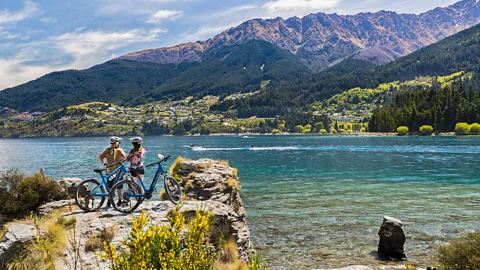 Better By Bike
Better By BikeQueenstown's huge environmental challenge stemmed from a concern that the region's infrastructure was struggling to cope with the sheer number of tourists coming to town. Queenstown is set around a massive lake, fringed by the rugged mountains of the country's Southern Alps. It's been a skiing hotspot since resorts first opened in the 1940s, but the development of an adventure tourism economy built around its dramatic landscape since the 1960s established the region as one of New Zealand's most popular destinations.
Last year, almost 400,000 international visitors came here, an almost-20% rise since 2019, just before the pandemic. This number is particularly significant when you consider Queenstown has a permanent population of around 50,000.
Green Getaways
Green Getaways is a BBC Travel series that helps travellers experience a greener, cleaner approach to getting out and seeing the world.
"Locals were asking, what's in this for us," Woods says. "And can we really sustain this region the way it's going?"
The three local regional tourism organisations – Destination Queenstown, Queenstown Lakes District Council and Lake Wanaka Tourism – proposed the audacious goal in 2021 and were surprised at the support they got from tourism operators. "We took the plan out to the community and weren't sure what to expect," Woods says. "And everyone supported it. And that's the most important part in all of this. Every person has to play a part."
That could be someone like… say, Mr Chippy. While New Zealand eagerly awaits the really big shifts towards environmental sustainability in tourism – like the trial of the region's first e-plane flight, set for 2026 on an Air New Zealand cargo route between Wellington and the Marlborough Sounds – Mr Chippy, aka Michael Sly, has been quietly composting 20 tonnes of hotel food waste each month around Queenstown. His company, Waste To Wilderness, turns the scraps left by tourists into nutrient-dense soil used for food growing – a perfect example of regenerative tourism. "You don't have to take giant leaps," he says. "Take little steps in the right direction and you'll be amazed by what you can achieve."
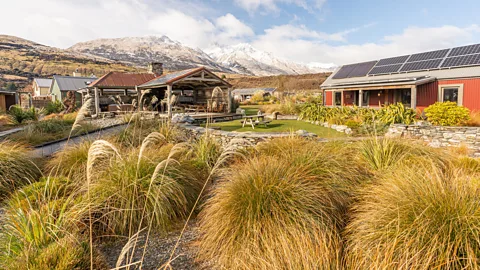 Destination Queenstown
Destination QueenstownThough given the number of tourists coming to the Queenstown region each year, local accommodation providers must become the most consequential players in Queenstown's plan to run on alternative energy. The promising news is that already no accommodation can match what Headwaters Eco Lodge has achieved – and long before the 2030 goalpost. It's the first accommodation on the planet to be recognised by the Living Building Challenge, the most rigorous of all environmental assessment programmes.
Surrounded on all sides by the Southern Alps and braided river valleys in the picture-perfect hamlet of Glenorchy, 45 minutes' drive west of Queenstown, the lodge is built entirely from recycled building material. It uses the world's most advanced compost toilets, while every single litre of wastewater irrigates extensive wetlands built through the middle of the property. All of its power comes from one of the South Island's largest solar gardens – there's nearly 600 solar panels on site – which produce so much energy that the excess is used to power another business up the road.
PLAN YOUR TRIP
Where to stay: Choose Headwaters Eco Lodge or Sherwood Queenstown for eco-friendly accommodation options.
What to do: Take a wine tour of Queenstown's Central Otago region aboard an electric vehicle; book a Tesla tour to Queenstown's most picturesque attractions; go jet-boating along the Shotover River.
Where to eat: Check out Sherwood's sustainable cuisine, where hyper-seasonal ingredients are grown or foraged; or head to The Dishery, which specialises in locally sourced and ethical food, cocktails and wine.
"My husband Paul and I came up this idea of creating these slow tourism experiences that could support this idea of regenerative design," says Headwaters Eco Lodge co-owner, Debbi Brainerd. "We're in the most beautiful place here in Glenorchy. We liked the idea of creating accommodation that had a positive carbon affect, so we created these things in design to help us get there."
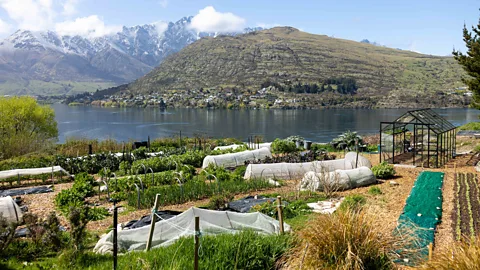 Sherwood Queenstown
Sherwood QueenstownWithin Queenstown itself, a refurbished 40-year-old motor inn, Sherwood Queenstown, made Expedia's Top 10 eco-friendly stays list in 2019. It runs almost entirely off 248 solar panels and a full-time horticulturist grows nearly half of all produce required by the hotel's restaurant on a hillside within the property that overlooks Lake Wakatipu. "We say that it's all about small things done consistently that really make a difference," explains general manager Hayley Scott. "But it's also important to have big goals to work towards. Everyone in this community is committed to getting as close to achieving carbon-zero by 2030 as we can. It's got us all thinking."
Dig a little deeper and you'll find that world-first environmental innovation is happening across the Queenstown region. Shotover Jet, which whisks travellers through the narrow canyons of Queenstown’s Shotover River at 85 km/h, are trialling the world's first electric-powered jet boat. It's taken three years, but the prototype boat is capable of the same spins and turns – where pilots drive guests just centimetres from the cliffs beside the Shotover River – as their fuel-powered counterparts. But the electric version will actually be far more powerful than the original fuel model. And once it's built, Shotover Jet plan to share the prototype with the rest of the industry to ensure carbon output is eliminated across all jet boat companies in Queenstown.
More like this:
• 10 sustainable travel destinations to visit in 2024
And the world's first electric hydro-foiling ferry will soon start operating on a lake just south-west of Queenstown. Expected to save more than 240 tonnes of carbon emissions each year (equivalent to taking 52 petrol cars off the road), the Swedish-designed ferry will operate on Lake Manapouri from early 2025 using battery power only. The same type of ferry is expected to operate on Lake Wakatipu next, with local marinas recently updated to enable electric boat charging for all lake users.
And the innovations towards a carbon zero visitor economy keep on coming. A local wine tour company – Appellation Wine Tours – has introduced two new electric vehicles to their fleet; while tour company Nomad Safaris started Tesla Tours, taking zero-emission electric vehicles on private tours to the most scenic parts of the region, like an area just beyond Glenorchy dubbed "Paradise", where rivers running down from glaciers high in the national park above feed the deep waters of Lake Wakatipu.
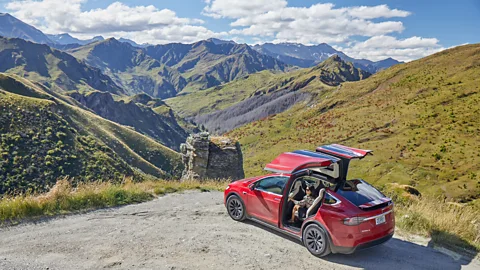 Destination Queenstown
Destination QueenstownThe region has also developed 130km of bike trails that follow the edge of Lake Wakatipu and lead deep into the backcountry beyond town, sometimes along swaying suspension bridges crossing the emerald-coloured Kawarau River, making it globally recognised as a cycling destination. By 2026, it's estimated biking will reach as much as 50% the size of the more carbon-unfriendly ski visitor economy that currently dominates tourism in the area.
And every one of these developments spur other businesses to push for their own environmental victories and make the next big carbon-zero conquest. As global temperatures surge and storms wreak destruction of unprecedented proportions, it's inspiring to see an entire community of tourism operators embark on a challenge that, if successful, will cut 20 years off the carbon-zero target set by the United Nations Climate Change Council. Their efforts may go largely unnoticed in mainstream media, but this community of former fuel-guzzlers plan to show the world there's still hope for us all yet.
--
If you liked this story, sign up for The Essential List newsletter – a handpicked selection of features, videos and can't-miss news, delivered to your inbox twice a week.
